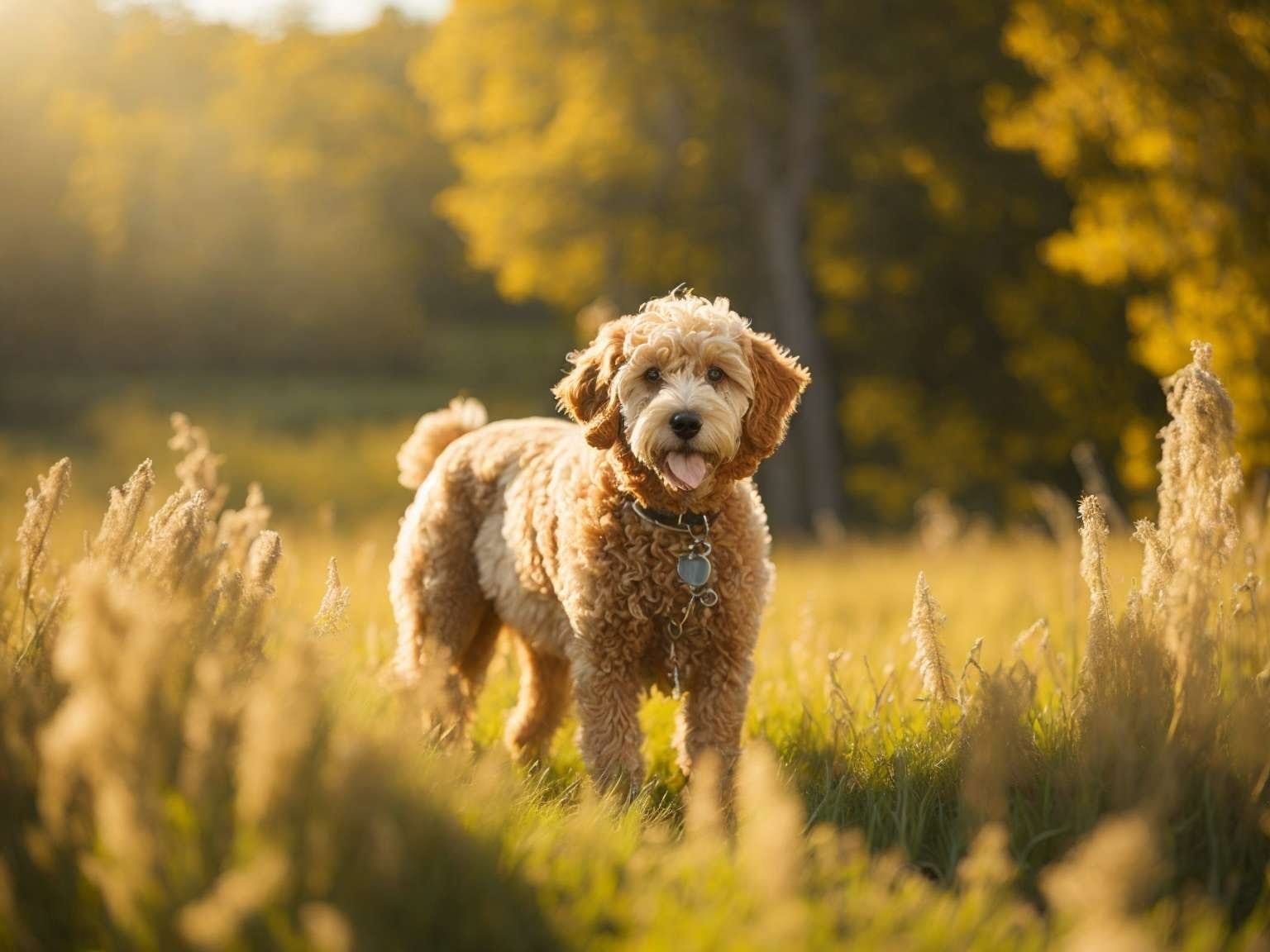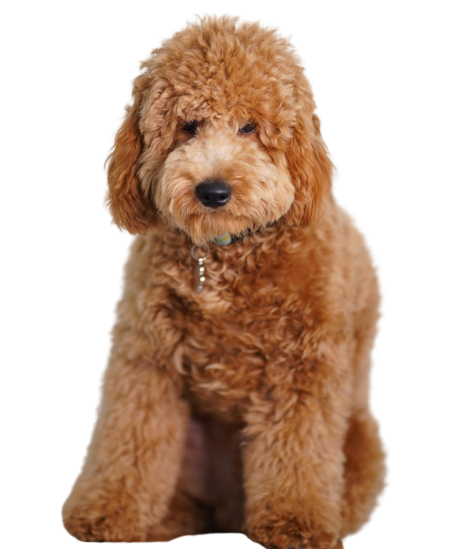Caring for a senior Mini Goldendoodle can often be a challenge, encompassing both physical and emotional needs. As the proud parent of an aging floof myself, I’ve experienced firsthand the unique attention they require which includes regular vet visits, perfect nutrition balance, and mental stimulation.
With this article unpacking everything from dietary changes to daily exercise regimens, you’ll uncover practical ways to make your four-legged companion’s golden years truly golden. Ready to embark on this age-specific care journey? Let’s dive right in!
Key Takeaways
- Senior Mini Goldendoodles require special care and attention to ensure their health and well-being.
- Switching to senior dog food with higher protein, lower calories, and added nutrients is crucial for their overall health.
- Regular check-ups, bloodwork, and monitoring for signs of illness are essential in catching potential health concerns early on.
- Common health problems in older Goldendoodles include Gastric Dilation and Volvulus, allergies, cataracts, arthritis, obesity, cancer, dental disease, and heart disease.
- Keeping your Goldendoodle active through regular exercise and providing mental stimulation helps maintain their physical and mental well-being.
- Proper dental hygiene is important for overall health; regular brushing with dog-friendly toothpaste and providing chew toys or dental chews can help prevent dental issues.
Special Care and Attention Needs for Senior Mini Goldendoodles
As senior Mini Goldendoodles age, they require special care and attention to ensure their health and well-being.
Switch to a senior dog food
As your precious mini Goldendoodle enters its golden years, proper nutrition becomes even more crucial. Senior dog food is specifically formulated to meet the unique dietary needs of older dogs like our mini Goldendoodles.
This type of food often includes higher amounts of quality protein for muscle maintenance, lower calories to prevent obesity, and added nutrients that support joint health and cognitive function.
Transitioning your senior goldendoodle to a diet designed for their life stage can significantly enhance their overall health and well-being. It’s a simple yet essential step to ensure they get the best care possible during this special phase of life
Regular yearly checkups and bloodwork
It’s crucial to prioritize regular yearly checkups and bloodwork for our senior mini Goldendoodles. These routine visits to the veterinarian play a vital role in keeping our furry friends healthy and happy.
During these appointments, your vet will thoroughly examine your dog from nose to tail, checking for any signs of illness or underlying health issues. They may also recommend taking blood samples to run various tests that can provide valuable insights into your Goldendoodle’s overall well-being.
By staying proactive with regular checkups and bloodwork, you have the opportunity to catch any potential health concerns early on. Remember, prevention is always better than cure when it comes to the health of our beloved pets.
With their expert guidance and careful monitoring, veterinarians can help ensure that your senior mini Goldendoodle receives proper care tailored specifically to their needs.
Keeping up with these regular examinations not only helps maintain good physical health but also gives you peace of mind knowing that you’re doing everything possible for your four-legged companion’s well-being as they age gracefully by your side.

Monitoring for signs of illness
Generally, it’s crucial to keep a close eye on their health and watch for any signs of illness. Here are some important things to monitor:
- Changes in appetite: Pay attention to any changes in your Goldendoodle’s eating habits. A sudden decrease or increase in appetite could be an indication of an underlying health issue.
- Weight loss or gain: Monitor your mini Goldendoodle’s weight regularly. Significant weight loss or gain could signal an underlying health problem, such as thyroid issues or digestive disorders.
- Lethargy or low energy levels: If your usually energetic Goldendoodle becomes unusually lethargic or lacks interest in activities, it’s worth investigating further. This could be a sign of pain, arthritis, or other health concerns.
- Digestive issues: Keep an eye out for any changes in bowel movements, including diarrhea, constipation, or blood in the stool. Digestive issues can be indicative of food allergies, gastrointestinal diseases, or parasites.
- Changes in urination: Observe your pet’s urination patterns. Frequent urination, difficulty urinating, blood in urine, or accidents inside the house may indicate urinary tract infections or kidney problems.
- Skin and coat problems: Check for any skin abnormalities like rashes, redness, dryness, hair loss, or excessive itching. These symptoms can point to allergies or dermatological conditions that require attention.
- Respiratory issues: If you notice labored breathing, coughing, sneezing, or wheezing sounds when your mini Goldendoodle breathes – it might be time for a vet visit since these symptoms could be related to respiratory infections.
- Changes in behavior: Any significant changes in behavior patterns should not be ignored as they can indicate underlying medical conditions such as anxiety disorders or cognitive decline.
Common health problems in older Goldendoodles (Gastric Dilation and Volvulus, allergies, cataracts, arthritis, obesity, cancer, dental disease, heart disease)
You need to be aware of the common health problems that this breed may experience, especially in their senior years. These range from Gastric Dilation and Volvulus to allergies, cataracts, arthritis, obesity, cancer, dental disease, and heart disease. The following table provides a quick overview of each condition.
| Health Problem | Description |
|---|---|
| Gastric Dilation and Volvulus | This condition involves the expansion and twisting of the stomach which can block the blood supply. It is a life-threatening emergency and requires immediate veterinary attention. |
| Allergies | Mini Goldendoodles can be allergic to certain foods, environmental factors, or fleas. Symptoms may include itchiness, skin infections, and digestive issues. |
| Cataracts | As they age, your pet may develop a cloudiness in the lens of the eye, leading to vision loss. Regular vet check-ups can help detect this condition early. |
| Arthritis | Older Goldendoodles may suffer from joint inflammation, leading to stiffness and pain. Exercise and weight control are crucial to keep arthritis at bay. |
| Obesity | A combination of overeating and lack of exercise can lead to obesity. This can further lead to other health problems like diabetes and heart disease. |
| Cancer | Like humans, dogs can also develop cancer. Regular vet examinations can detect unusual growths or lumps in your pet. |
| Dental Disease | Bad breath, difficulty eating, and red gums can be signs of dental disease. Regular dental check-ups and brushing your pet’s teeth can prevent these issues. |
| Heart Disease | Heart disease in dogs can cause coughing, difficulty breathing, and lethargy. Regular check-ups can help in early detection and management. |
Being aware of these potential health issues and taking necessary steps to prevent or manage these problems can help your senior Mini Goldendoodle live a happy, healthy, and fulfilling life.
Keeping your Goldendoodle active
From my experience, it is essential it is to keep your Goldendoodle active and engaged. Regular exercise is not only beneficial for their physical health but also for their mental well-being.
Whether it’s going for daily walks, playing fetch in the backyard, or even participating in agility activities, keeping your Goldendoodle active is key to ensuring they lead a happy and fulfilling life.
Regular exercise helps prevent weight gain and obesity, which can be common issues in older dogs. It also helps to strengthen their muscles and joints, reducing the risk of arthritis and other mobility problems.
By engaging in physical activities with your Mini Goldendoodle, you’re providing them with the opportunity to release pent-up energy while improving their overall fitness level.
In addition to exercise, mental stimulation is equally important for these intelligent and curious dogs. Puzzle toys or interactive games that challenge their problem-solving abilities can help keep their minds sharp and ward off cognitive decline as they age.
Plus, spending quality time together during play sessions strengthens the bond between you and your furry friend.
Remember that every dog has different activity needs based on factors such as age, health condition, and individual preferences. Always consult with your veterinarian before starting any new exercise regimen or introducing mentally stimulating activities for your Goldendoodle.
Maintaining proper dental hygiene
Taking care of your senior Mini Goldendoodle’s dental hygiene is crucial for their overall health and well-being. Just like humans, dogs can develop dental issues over time, such as tartar buildup, plaque, and gum disease.
To keep your furry friend’s teeth in tip-top shape, there are a few simple steps you can follow.
Firstly, it’s important to establish a regular dental care routine. Brushing your dog’s teeth at least two to three times a week using a dog-friendly toothbrush and toothpaste specially formulated for dogs is highly recommended.
This helps remove plaque and prevents the formation of tartar.
In addition to regular brushing, providing chew toys or dental chews that are designed to promote good oral health can also help maintain clean teeth and gums. These chew aids work by reducing plaque build-up through the mechanical action of chewing.
Another aspect of maintaining proper dental hygiene in senior Mini Goldendoodles is scheduling professional veterinary cleanings when necessary. Your veterinarian will be able to assess your dog’s oral health during check-ups and provide recommendations on when professional cleaning may be needed.
Essentially, caring for senior mini Goldendoodles requires special attention and care. From switching to senior dog food to regular check-ups and monitoring for signs of illness, it’s essential to prioritize their health.
Additionally, providing them with mental stimulation, maintaining proper dental hygiene, and keeping them active will help ensure they lead happy and fulfilling lives in their golden years. With the right care and attention, these affectionate and playful dogs can continue bringing joy to their owners for many years to come.
FAQs
1. How should I adapt my senior mini Goldendoodle’s diet and exercise routine?
As your mini Goldendoodle ages, it is important to adjust their diet and exercise routine to meet their changing needs. Consult with your veterinarian to determine the appropriate type and amount of food for your dog’s age, size, and activity level. Additionally, consider incorporating low-impact exercises such as short walks or gentle playtime instead of high-intensity activities.
2. What are common health issues that senior mini Goldendoodles may face?
Like any dog breed, senior mini Goldendoodles can be prone to certain health issues as they age. Some common concerns include arthritis, dental problems, weight gain or loss, vision or hearing loss, and cognitive decline. Regular veterinary check-ups and proactive care can help identify and manage these conditions.
3. Are there specific grooming needs for senior mini Goldendoodles?
Senior mini Goldendoodles still require regular grooming to keep their coat healthy and free from mats or tangles. However, older dogs may have more sensitive skin or joint stiffness that could make grooming sessions uncomfortable. Take extra care when brushing or bathing them and consider shorter grooming sessions if necessary.
4. How can I provide mental stimulation for my senior mini Goldendoodle?
Mental stimulation is crucial for the overall well-being of a senior dog like a mini Goldendoodle. Engage in activities that challenge their minds such as puzzle toys, interactive games, or training sessions with rewards-based positive reinforcement techniques. These activities not only keep their brains active but also strengthen the bond between you and your furry companion.

